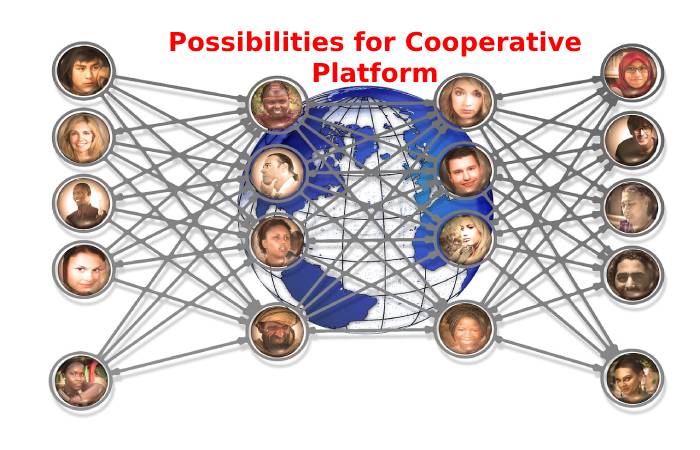Table of Contents
What is a Cooperative Platform
A unified cooperative platform is a company inspired by the so-called sharing economy. This concept emerged around 2010 and has evolved since then. In a very simplified way, sharing economy uses technology to facilitate access to goods and services.
Shared Economy
Think, for example, that you need to hang a picture on the wall, but you don’t have a drill. You could buy one, but you might not have any other uses for it for months or years to come. Why not then rent? The answer varies greatly. Let’s limit ourselves to two examples: “the company that rents is far away” and “I don’t know how to use a drill.”
For the first case, the sharing economy connects ordinary people. So you could rent it from someone who lives a block away who, at some point, also needed to hang a picture and now has idle equipment at home. The second leads to an evolution of the concept. After all, it is possible to share goods and knowledge in service. More specifically, the advent of the sharing economy (the original term) makes it possible to hire a person who has a drill and knows how to use it.
It is where the sharing economy gets more sophisticated. After all, we are now talking about meeting specific demands. Going back to the drill example, the person needed a drill, but a hole. Just as it is possible to say that few people need a car. The demand is for displacement.
You can argue that general service professionals and taxi drivers have been around for a long time, right? That’s true. However, you would need to contact a specific professional, make a phone call, count on his availability and, finally, run the risk of being poorly answered.
You demand the system with the sharing economy, and it returns with the possibilities. You choose the professional according to your needs, and you already know, in advance, what the evaluation of previous clients is. This convenience makes all the difference.
How did the Cooperative Platform Concept Come About?
Professor Trebor Scholz coined the term cooperative platform, author of the book “Platform Corporativism – Contesting the Corporate Sharing Economy”. The Brazilian edition was translated into Portuguese by lawyer Rafael Zanita. This one, a scholar of the LGPD, the General Law for the Protection of Personal Data.
A unified platform is a cooperative and technological institution. Thus, it acts as an online service platform. In short, co-op platforms ride the same wave as gig economy companies . However, guided by cooperative principles. And that also makes all the difference. It is also essential to remind that it is not simply a derivation of corporativism due to the advent of new technologies.
Platform corporativism represents the development of fairer sharing economy business alternatives. A collaborative platform has more room for diversification and promotes better distribution of benefits.
Thinking about the functioning of a unified platform, this sharing business model can be improved. All to bring benefits to those who are providing the service. Through this logic, the drivers would be the actual owners of Uber and not the shareholders and investment funds. Therefore, profits would be distributed more fairly, and there would be a more transparent policy for the use of data.
Possibilities for Cooperative Platform

In general, all the fronts that companies in the gig economy currently explore can be attacked in a collaborative platform. The Internet of Ownership (a collaborative platform) proposes three influential groups for cooperative platforms to operate:
- More specific categories or more prominent startups with regional operations
- Workers who seek to avoid intermediaries in the exploitation of rents or labour
- Leasing of collectively owned goods
In this way, the Internet of Ownership brings 15 ideas for cooperative platforms :
shared transport
- Shared rides, similar to Uber
- On-demand mobility, such as car rental
work on demand
- Task apps for self-employed workers such as translators, designers, etc.
- Food delivery, similar to I Food
- Dog walking
- Freelancer on demand
- Freelancers for software and website development
music and arts
- Direct sponsorship to support musicians and artists
- Clubs
- Streaming, similar au Spotify
member clubs
- Cowering and member clubs such as We Work
Education
- Online courses, similar to Udemy and Coursera
- Music classes
- programming classes
Digital media
As we have seen, there are many possibilities. And there is a Directory that aims to list all initiatives of this type that exist on the planet. There are already more than 250 cooperative platform initiatives in the world. They are spread across 26 countries, including Brazil.
Non Cooperative Platforms
The cooperative platform aspect is still little explored in Brazil. However, Scholz believes that the more precarious a country’s working relationship, the greater the interest in implementing platform cooperatives.
In this way, there are many opportunities, mainly in education, health and transport in the country. However, there are still cultural barriers to disseminating the model, which demands distribution of decision-making power.
In addition, Brazilian legislation lacks instruments to support the development of a cooperative platform. The General Law on Cooperatives, for example, poses challenges, including democratic participation and the decision-making process in the digital context.
Still, there are cooperative platform initiatives in Brazil. An example is Vou Bem, from Maringa. Created by Cooper Dinâmica, VouBem was born from the dissatisfaction of drivers with the fees charged by Uber. Another platform co-op initiative is Cataki, which bills itself as a recycling app. Pataki proposes to bring together waste generators and waste pickers, increasing recycling and income.
Consortium for Platform Corporativism
Based in New York, The New School has an institute to foster the creation of platform cooperatives. Launched in May 2019, the ICDE (Institute for the Digital Cooperative Economy) is a research arm of the Consortium of Cooperative Platforms.
The New School – Cooperative Platform. In this way, the group supports the cooperative platform model through research, training, legal advice, mapping of best practices, technical support and financing .
The Consortium is an initiative of Trebor Scholz and is configured as an international network that supports the economy of the cooperative platform. The industry has already received $1 million in funding from Google.
Conclusion
We have seen that a cooperative platform can be a means to generate employment and wealth for society. This business model promotes the use of technology in the same way as gig economy initiatives. However, fairer data usage and profit distribution policies avoid distortions generated by capitalist platforms.

